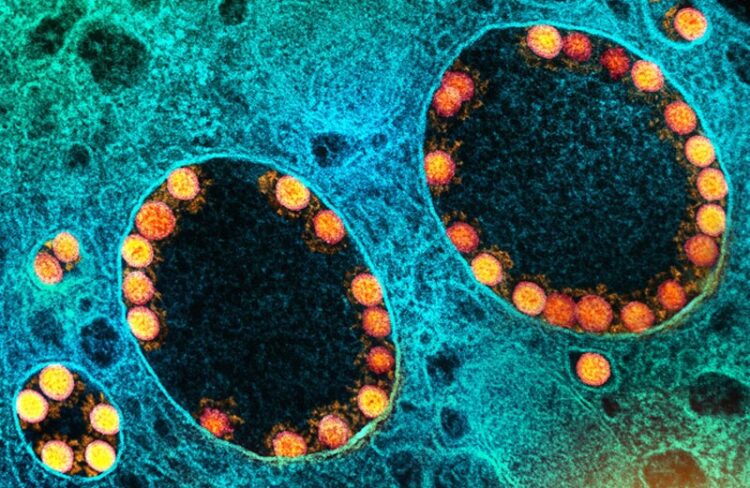Mix-and-match trial finds additional dose of COVID-19 vaccine safe, immunogenic

Transmission electron micrograph of SARS-CoV-2 virus particles (gold) within endosomes of a heavily infected nasal epithelial cell.
Credit: NIAID
NIAID-sponsored study assessed dose in adults fully vaccinated with any EUA or approved COVID-19 vaccine.
In adults who had previously received a full regimen of any of three COVID-19 vaccines granted Emergency Use Authorization (EUA) or approved by the Food and Drug Administration (FDA), an additional booster dose of any of these vaccines was safe and prompted an immune response, according to preliminary clinical trial results reported in The New England Journal of Medicine. The findings served as the basis for recommendations by the FDA and the Centers for Disease Control and Prevention in late fall 2021 to permit mix-and-match COVID-19 booster vaccinations in the United States. Additional data from the ongoing Phase 1/2 trial, sponsored by the National Institute of Allergy and Infectious Diseases (NIAID), part of the National Institutes of Health, are expected in the coming months.
The new report describes findings from 458 adults who had been fully vaccinated with any of three EUA COVID-19 vaccines at least 12 weeks prior to enrollment and who had no reported history of SARS-CoV-2 infection. At enrollment, a single booster dose was administered to each participant: 150 received Janssen/Johnson & Johnson’s Ad26.COV2.S vaccine; 154 received Moderna’s mRNA-1273 vaccine; and 154 received Pfizer-BioNTech’s BNT162b2 vaccine. Depending on which primary vaccine regimen a participant had received, the booster vaccine was either different (mixed, or heterologous) than or the same (matched, or homologous) as the original vaccine.
The trial participants kept diaries of any side effects. More than half of participants reported headache, pain at the injection site, muscle aches and malaise. No serious vaccine-related adverse events were reported.
All combinations of primary and booster vaccine resulted in increased neutralizing antibody levels (ranging from 4.2- to 76-fold higher levels than those detected prior to boost.) Likewise, all primary-boost combinations increased binding antibody levels 4.6- to 56-fold. For each primary EUA COVID-19 vaccine, heterologous boosts elicited similar or higher antibody responses as compared to responses to a homologous booster. Cellular responses (CD4 and CD8 T cell) also increased in all but the homologous Ad26.CoV2.S-boosted group, though CD8+ T cells were highest at baseline in those participants who had received the Ad26.CoV2.S EUA vaccine.
Taken together, the investigators concluded, “these data strongly suggest that homologous and heterologous booster vaccine will increase protective efficacy against symptomatic SARS-CoV-2 infection.”
These interim results cover available immunogenicity data through the initial 29 days following booster vaccination. Investigators will continue to follow participants for one year to assess what impact booster vaccination has on longer-term immune responses. Additional arms of the trial may test other investigational, EUA or FDA-approved COVID-19 vaccines and/or vaccines based on SARS-CoV-2 variants as the boosting vaccine.
The trial began in May 2021 and is continuing to enroll participants. Its principal investigators are Robert L. Atmar, M.D., of Baylor College of Medicine, Houston; and Kirsten E. Lyke, M.D., of the University of Maryland School of Medicine, Baltimore. It is being conducted through NIAID’s Infectious Diseases Clinical Research Consortium, a clinical trials network that encompasses the Institute’s longstanding Vaccine and Treatment Evaluation Units (VTEUs). Additional information about the trial, including a listing of trial sites enrolling volunteers, is available at ClinicalTrials.gov using the identifier NCT04889209.
NIAID grants supporting this research were UM1AI48372, UM1AI148373, UM1AI148450, UM1AI148452, UM1AI148573, UM1AI148574, UM1AI148575, UM1AI148576, UM1AI148684 and UM1AI148689. Contract 75N93019C00050 from the NIAID Collaborative Influenza Vaccine Innovation Centers (CIVICs) also provided support.
ARTICLE:
RL Atmar et al. Homologous and heterologous COVID-19 booster vaccinations. The New England Journal of Medicine DOI: 10.1056/NEJMoa2116414 (2022).
WHO:
Dr. John H. Beigel, associate director for clinical research in NIAID’s Division of Microbiology and Infectious Diseases, is available to discuss the study.
CONTACT:
To schedule interviews, contact the NIAID News & Science Writing Branch at 301-402-1663 or NIAIDNews@niaid.nih.gov.
NIAID conducts and supports research—at NIH, throughout the United States, and worldwide—to study the causes of infectious and immune-mediated diseases, and to develop better means of preventing, diagnosing and treating these illnesses. News releases, fact sheets and other NIAID-related materials are available on the NIAID website.
About the National Institutes of Health (NIH): NIH, the nation’s medical research agency, includes 27 Institutes and Centers and is a component of the U.S. Department of Health and Human Services. NIH is the primary federal agency conducting and supporting basic, clinical, and translational medical research, and is investigating the causes, treatments, and cures for both common and rare diseases. For more information about NIH and its programs, visit www.nih.gov.
NIH…Turning Discovery Into Health®
Journal: New England Journal of Medicine
DOI: 10.1056/NEJMoa2116414
Article Title: Homologous and heterologous COVID-19 booster vaccinations
Media Contact
NIAID News & Science Writing Branch
National Institute of Allergy and Infectious Diseases
niaidnews@niaid.nih.gov
Office: 301-402-1663
Media Contact
All latest news from the category: Health and Medicine
This subject area encompasses research and studies in the field of human medicine.
Among the wide-ranging list of topics covered here are anesthesiology, anatomy, surgery, human genetics, hygiene and environmental medicine, internal medicine, neurology, pharmacology, physiology, urology and dental medicine.
Newest articles

Innovative 3D printed scaffolds offer new hope for bone healing
Researchers at the Institute for Bioengineering of Catalonia have developed novel 3D printed PLA-CaP scaffolds that promote blood vessel formation, ensuring better healing and regeneration of bone tissue. Bone is…

The surprising role of gut infection in Alzheimer’s disease
ASU- and Banner Alzheimer’s Institute-led study implicates link between a common virus and the disease, which travels from the gut to the brain and may be a target for antiviral…

Molecular gardening: New enzymes discovered for protein modification pruning
How deubiquitinases USP53 and USP54 cleave long polyubiquitin chains and how the former is linked to liver disease in children. Deubiquitinases (DUBs) are enzymes used by cells to trim protein…



